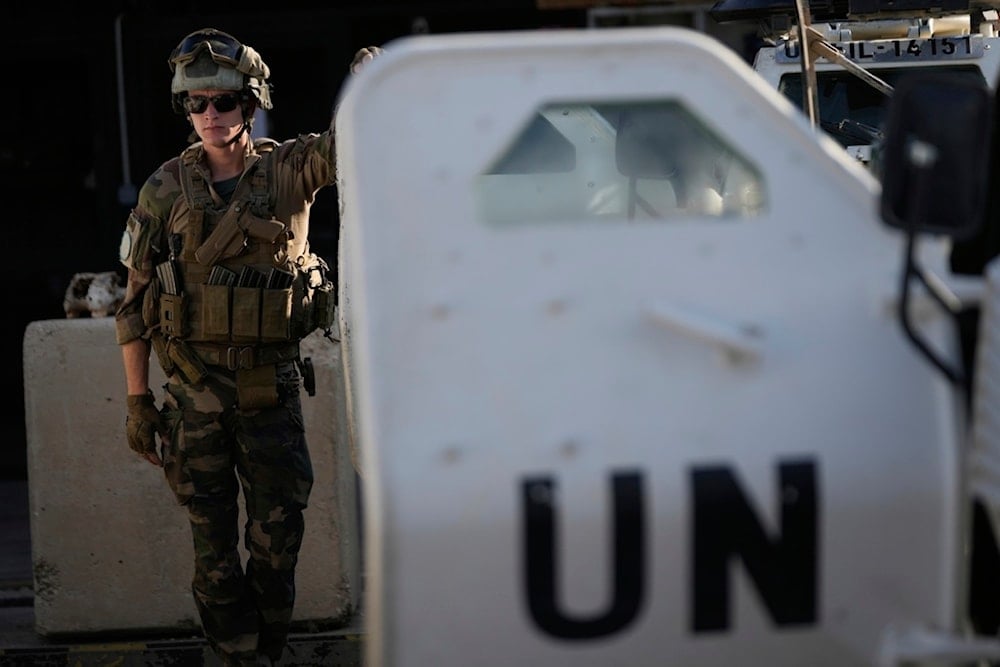UNIFIL: Israeli wall crosses Blue Line, seizes land in Lebanon
UNIFIL confirms Israel’s wall near Yaroun violates Resolution 1701, taking 4,000 m² of Lebanese land, and warns of over 10,000 Israeli violations since last year.
-

A French UN peacekeeper stands beside an armored vehicle at his base, waiting to move with his unit for a patrol along the Lebanese-occupied Palestinian border area in Deir Kifa, southern Lebanon, Wednesday, August 20, 2025 (AP)
A spokesperson for the United Nations Interim Force in Lebanon (UNIFIL) told Al Mayadeen that the Israeli occupation has built portions of a border wall that extend into Lebanese territory near Yaroun, in what the mission described as a clear violation of UN Security Council Resolution 1701.
“Israel has been building a wall for a number of years along the Blue Line on their side, but in these two instances, near Yaroun, it crosses the Blue Line and takes part of Lebanese territory onto the Israeli side,” the spokesperson said. “So we have protested this. This is obviously a violation of Resolution 1701 and of Lebanese territorial integrity and sovereignty.”
Peacekeepers surveyed the site and measured the barrier to assess its position relative to the Blue Line. According to UNIFIL, “Peacekeepers measured the wall, they found that it is inside Lebanese territory and takes about 4,000 square meters of Lebanese territory behind the wall.” The spokesperson added that the mission has formally notified the Israeli occupation forces. “We have written to the IDF to inform them of the violation. They have responded, saying that they will look into it.”
UNIFIL stressed that it will continue to follow up with both sides: “We will continue to protest this to the IDF and follow up on it, and we will continue to speak to authorities on all sides to ensure that violations of Resolution 1701 are reduced to the extent possible. Any violation, any crossing of the line is a violation of Resolution 1701. So this wall simply should not be in Lebanese territory, and we have expressed that to the IDF.”
UNIFIL: Over 10,000 violations recorded since last year
The spokesperson revealed that UNIFIL has documented “over 10,000 violations altogether” by air and land since last year. “And frankly, most of them are from the Israeli side.”
The spokesperson noted that even minor violations risk triggering escalation: “Any violation can lead to a misunderstanding and escalation that can cause a greater conflict that can lead us back to the conflict that we saw a year ago.”
While all violations are considered serious, some have directly endangered civilians: “We see violations that are definitely causing more damage and causing harm to civilian infrastructure, and in fact harming civilians themselves. So these are obviously very, very serious violations, including airstrikes.”
The spokesperson specifically warned against the Israeli military’s presence beyond the Blue Line: “Even the presence of Israeli soldiers on Lebanese territory is a serious and constant violation because this again is interfering with the sovereignty and territorial integrity of Lebanon and it's also preventing both peacekeepers and the Lebanese army from patrolling throughout the South fully and the Lebanese army from deploying completely throughout South Lebanon.”
Freedom of movement obstructed
According to UNIFIL, certain Israeli positions inside Lebanon are blocking access routes used by peacekeepers and the Lebanese Army: “The presence of Israeli soldiers in South Lebanon is obviously an impediment to movement throughout South Lebanon, including for the Lebanese army and for us… in some cases our access routes to our patrols and to our positions have been blocked.”
UNIFIL continues to urge the withdrawal of Israeli troops who have crossed into Lebanese territory: “This is a concern for us and it's a concern that we've expressed to the IDF and we continually urge them to withdraw from Lebanese territory to ensure that peacekeepers and the Lebanese army have freedom of movement but also in respect for Lebanon's territorial integrity and sovereignty.”
The spokesperson acknowledged the challenges facing the LAF amid economic strain and Israeli military activity obstructing its redeployment: “There are a number of challenges that the army has faced in the past due to economic issues, and now the redeployment to the South that is not able to be quite completed due to the presence of Israeli forces along the Blue Line in certain locations.”
UNIFIL reaffirmed its commitment to assisting Beirut in fulfilling its obligations: “Peacekeepers are here to help them, to support them… We are there because this is our role under Resolution 1701 to ensure that the Lebanese Army has the support and ability to be able to implement their tasks under Resolution 1701.”
Israeli T-wall extends beyond Blue Line
According to a UNIFIL assessment conducted in October, a geospatial survey revealed that a concrete T-wall erected by Israeli forces southwest of Yaroun extended beyond the Blue Line, cutting off more than 4,000 square meters of Lebanese territory. Peacekeepers said they informed the Israeli occupation forces of the breach and formally requested the wall’s removal.
However, construction continued. In November, UNIFIL personnel documented additional T-wall expansion near Yaroun, again confirming through survey work that a section of the barrier southeast of the village crossed into Lebanon. The UN mission said it will also notify the occupation in writing regarding this second violation.
A separate wall under construction between Aytaroun and Maroun ar-Ras was noted to be situated south of the Blue Line, indicating multiple, ongoing alterations to the border area.
UNIFIL described the Israeli presence and wall-building inside Lebanese territory as clear violations of UN Security Council Resolution 1701, which ended the 2006 war and mandates respect for Lebanese sovereignty and territorial integrity. The peacekeeping force reiterated its call on the Israeli occupation to fully adhere to the Blue Line and withdraw from all areas north of it, underscoring the urgent need to prevent renewed escalation along the sensitive frontier.

 6 Min Read
6 Min Read








